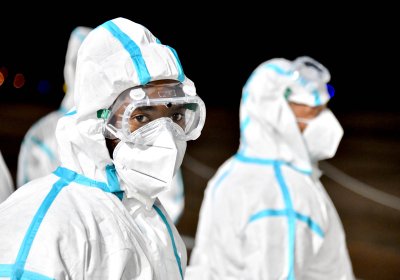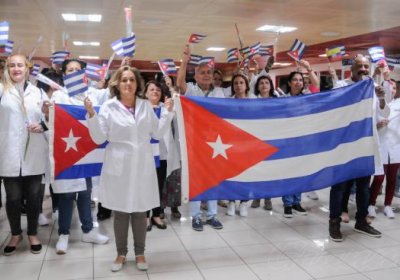Removed from the world’s prevailing vaccine distribution network, Cuba is the only nation in the Latin American and Caribbean region to develop its own vaccines against COVID-19, writes Ian Ellis-Jones.
Cuba
In the dying days of his presidency, Donald Trump’s administration redesignated Cuba a state sponsor of terrorism, writes Ian Ellis-Jones.
Despite a concerted campaign by the United States and its allies, Cuba continues its socialist project of international solidarity through medical care. It's therefore no wonder, according to Vijay Prashad, there is an international campaign to have Cuban doctors honoured with the Nobel Peace Prize.
Cuba is only a few days away from ending its coronavirus quarantine. Except for Havana, all the other provinces are free of the contagion and have begun moving toward a new normality, writes Fernando Ravsberg.
Under the guise of “escaping Communism”, the United States encouraged Cuban parents to send their children to the US. Deb Shnookal has done a great service in minutely researching this escapade in both Cuba and the US, using official documents and personal memories, writes Barry Healy.
Many people around the world have heard of Cuba's inspiring and unmatched international medical solidarity efforts in the COVID-19 pandemic, writes Peter Boyle. But how is Cuba faring in the struggle against the pandemic at home?
Cuban cartoonists confront COVID-19 with humour and a nasobuco (facemask).
Cuban medicine could treat thousands of coronavirus patients as production of a “flagship” drug known to combat the disease is set to increase significantly, writes Steve Sweeney.
Amid the mounting COVID-19 pandemic, capitalist governments around the world have clearly prioritised corporate welfare over public health. But Cuba has set an example of international solidarity in its response, writes Peter Boyle.
Cuba is the most sustainably developed country in the world, according to a new report launched on November 29.
The socialist island outperforms advanced capitalist countries including Britain and the United States, which has subjected Cuba to a punitive six-decades-long economic blockade.
Cuba still stands as a symbolic pole, reminding us that human society can be organised on the basis of solidarity, cooperation, and respect. This is a profound vision that stands clearly at odds with the individualist, profit-driven mantras of far-right leaders like Trump and Bolsonaro.
In 2008, the prestigious Council on Foreign Relations published a report titled US-Latin America Relations: A New Direction for a New Reality. Timed to influence the foreign policy agenda of the next US administration, the report asserted: “the era of the US as the dominant influence in Latin America is over.”
Then, at the Summit of the Americas the next year, then-president Barack Obama promised Latin American leaders a “new era” of “equal partnership” and “mutual respect”.
- Previous page
- Page 6
- Next page











